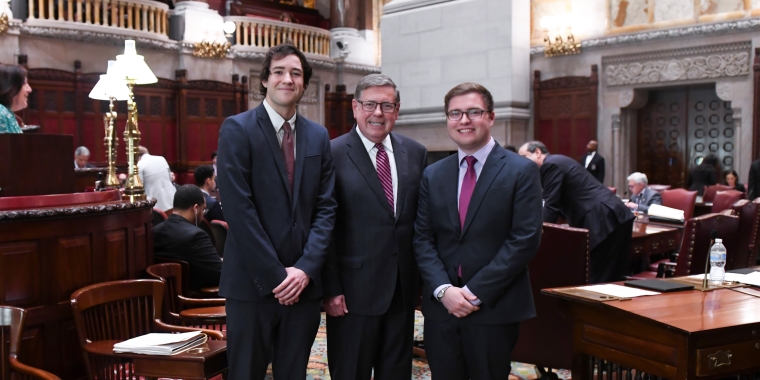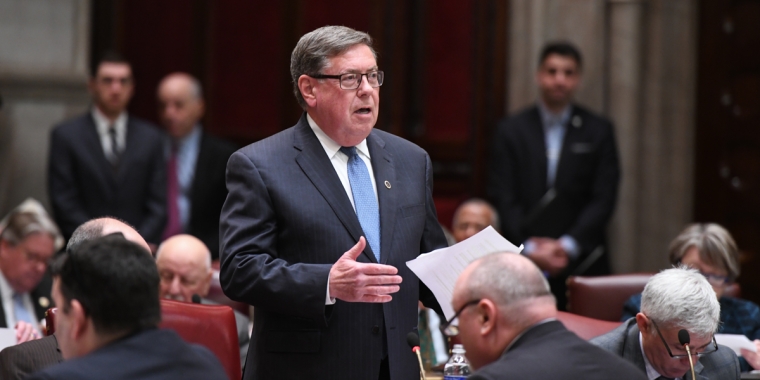
New Lending, Consumer Laws Kick In January 1
James L. Seward
Additional property tax relief totaling $1.3 billion for New York families, a consumer bill of rights for airline passengers, and legislation to improve oversight of the mortgage lending industry highlight the list of new laws scheduled to take effect on January 1, 2008.
I've asked homeowners what our number one priority should be, and they tell me it is reducing the crushing burden of high property taxes in New York State. On January 1, new laws taking effect will continue my effort to cut property taxes by providing an additional $1.3 billion in property tax relief in the form of direct rebate checks to homeowners across this state. Even with this tax relief, property taxes are still an enormous problem and the senate will work for even greater property tax relief next year.
The tax rebates represent the second year of a three-year expansion of the senate-initiated property tax rebate program. This year, the state is expected to provide approximately $1 billion in rebate checks to homeowners. In the fall of 2008, the program is expected to provide rebates totaling $1.3 billion.
Airline Passenger Bill of Rights. On January 1, 2008, the Airline Passengers’ Bill of Rights is scheduled to take effect to provide passengers stranded on airplanes at New York airports with basic amenities to make their wait more tolerable. Under the legislation, all airlines at New York airports will be required to provide snacks and water, fresh air and power, and working restrooms for passengers on planes that leave the gate and sit on the tarmac for more than three hours.
. On January 1, 2008, the Airline Passengers’ Bill of Rights is scheduled to take effect to provide passengers stranded on airplanes at New York airports with basic amenities to make their wait more tolerable. Under the legislation, all airlines at New York airports will be required to provide snacks and water, fresh air and power, and working restrooms for passengers on planes that leave the gate and sit on the tarmac for more than three hours.New York is home to some of the world’s busiest airports, and in enacting thelaw, we have taken the lead in protecting the rights of passengers. The law will ensure that stranded passengers are treated with respect by the airlines that serve our airports and are not held hostage on delayed flights without basic amenities.
Mortgage Lending Accountability. Recognizing concerns in the lending industry, legislation will take effect on January 1, 2008 to improve oversight and accountability of mortgage lenders.
Recognizing concerns in the lending industry, legislation will take effect on January 1, 2008 to improve oversight and accountability of mortgage lenders.The legislation (S.7431-A, Chapter 744, L. 2006) requires the registration of individual mortgage loan originators and sets educational standards to increase professionalism within the lending industry. New York's Banking Department, and regulators in other states, say that individuals who engage in abusive mortgage practices tend to move from company to company, and also from state to state. As a result, state regulators, through the Conference of State Bank Supervisors, are developing a nationwide registry of mortgage companies and their employees. Such a system would assist regulators in identifying and tracking any devious actors in the mortgage industry.
Here are some other laws enacted during the recent year which go into effect on January 1, 2008.
Workers' compensation. As part of a comprehensive workers' compensation reform bill, enacts various alterations to the method of calculation of the state assessment (a surcharge added to all workers' compensation policies that pays for the workers' compensation board and other administrative expenses) for group self-insurers, generally seeking to treat group self-insureds as a category unto themselves as opposed to considering them in with single-employer self-insureds.
Ethics reform. Legislation enacted this year reforms the ethical standards that apply to public officials and strengthens the oversight bodies charged with enforcing those standards.
Child advocate. The budget strengthens and establishes in statute the Office of the Ombudsman within the state Office of Children and Family Services (OCFS), to protect and promote the legal rights of youth under the jurisdiction of OCFS and to assist in providing oversight of children and to handle and investigate complaints.
Disease reporting. Hospitals will now have to report a suspected or confirmed (hospital acquired infection) HAI associated with another hospital to the originating hospital, mandating that documentation of reporting be maintained for 6 years, and requiring hospitals to report HAIs to the State Department of Health monthly rather than every 6 months as previously required.
Share this Article or Press Release
Newsroom
Go to NewsroomSchenevus School Aid Bill Signed into Law
June 25, 2019

Statement on 2019 Legislative Session
June 21, 2019

Professor Seward Meets with Former Students
June 20, 2019

